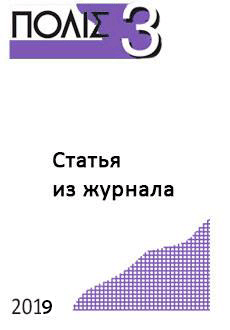Online shop of "Polis. Political Studies" Journal
We in the world, the world in us
Akhremenko A.S., Gorelskiy I.E., Melville A.Yu. How and Why Should We Measure and Compare State Capacity of Different Countries? An Experiment with Empirical Research. – Polis. Political Studies. 2019. No 3. P. 49-68 (In Russ.) .
Free!
state capacity, power and influence, methodology, measurement, quantitative and qualitative methods, hierarchical clustering, comparative analysis..
Based on the theoretical and methodological foundations of state capacity proposed and substantiated in the previous article of this journal (No. 2-2019) and the corresponding set of indicators for studying the multidimensional nature of this concept (level of military expenditures and aggregated indicator of control over violence, government and tax revenues, as well as the institutional quality and the level of the legal economy), in this article the authors focus on empirical perspectives of measuring state capacity. They rely on the use of multidimensional statistical methods (hierarchical clustering) and critically analyze the shortcomings of other approaches (dimensionality reduction, aggregation, rating) in relation to the array of collected data. The researchers’ contribution to the scientific discussion is one of the first attempts at alternative empirical testing of the state capacity index and the selection of eight stable structures typical for certain groups of countries, obtained as a result of the repeated application of the clustering procedure with the corresponding parameters (clusters “Successful development”, “Second echelon”, “Individual trajectories”, “The oil and gas needle”, “Outsiders”, “On the verge of failure”, “Rising Asian giants” and “Variations of the post-Soviet trajectories”). In conclusion, the authors emphasize that, despite the conventionality of the resulting clusters (due to the specificity of the method used, which allows the scales of such structures to be “tuned”), in general, they reveal typologically similar variants of state development, taking into account the specificity of historical circumstances, internal and external conditions, and strategic decisions made by national elites.
 English
English Русский
Русский

Reviews
There are no reviews yet.